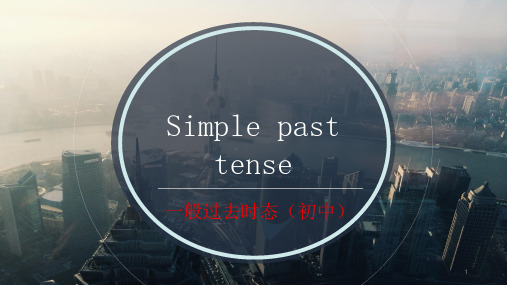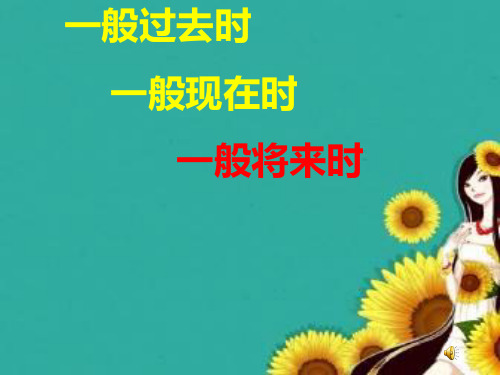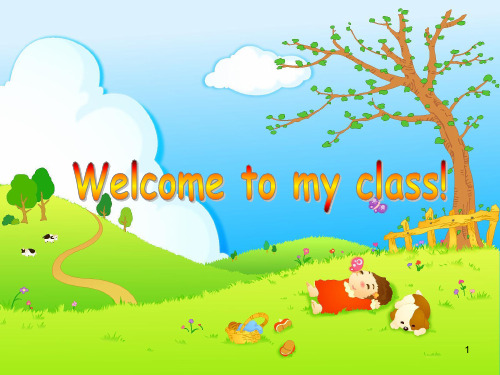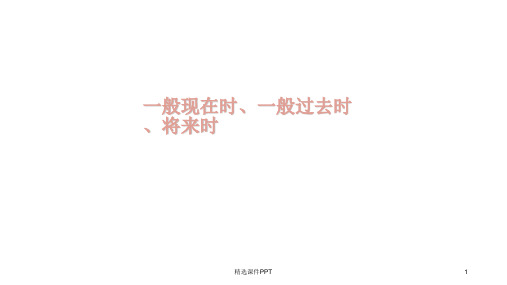一般现在时 一般过去时 一般将来时 (共40张PPT)
合集下载
一般现在时现在进行时和一般过去时和一般将来时态ppt课件

• I was not born in 1980. • Were you born in 1980?
经营者提供商品或者服务有欺诈行为 的,应 当按照 消费者 的要求 增加赔 偿其受 到的损 失,增 加赔偿 的金额 为消费 者购买 商品的 价款或 接受服 务的费 用
第二种
含有行为动词的
• 肯定结构 • 主语+行为动词(过去式)+其它
加es.如:study carry
练习:写出下列动词的三单形式
enjoyS stays plays stops runs
have has are is
经营者提供商品或者服务有欺诈行为 的,应 当按照 消费者 的要求 增加赔 偿其受 到的损 失,增 加赔偿 的金额 为消费 者购买 商品的 价款或 接受服 务的费 用
• 3)末尾只有一个辅音字母的重读闭音节,应先双 写这个辅音字母,再加-ed.
• e.g. shop-----shopped; stopped
• 4)以"辅音字母+y"结尾的动词,先把y变成i,再加ed. e.g. carry----carried; study------studied.
经营者提供商品或者服务有欺诈行为 的,应 当按照 消费者 的要求 增加赔 偿其受 到的损 失,增 加赔偿 的金额 为消费 者购买 商品的 价款或 接受服 务的费 用
prefer preferring
经营者提供商品或者服务有欺诈行为 的,应 当按照 消费者 的要求 增加赔 偿其受 到的损 失,增 加赔偿 的金额 为消费 者购买 商品的 价款或 接受服 务的费 用
一般过去时
•
一般过去时主要表示过去某时发生的动作或 情况
• 1态)。过去某个时间所发生的动作或存在的状
经营者提供商品或者服务有欺诈行为 的,应 当按照 消费者 的要求 增加赔 偿其受 到的损 失,增 加赔偿 的金额 为消费 者购买 商品的 价款或 接受服 务的费 用
第二种
含有行为动词的
• 肯定结构 • 主语+行为动词(过去式)+其它
加es.如:study carry
练习:写出下列动词的三单形式
enjoyS stays plays stops runs
have has are is
经营者提供商品或者服务有欺诈行为 的,应 当按照 消费者 的要求 增加赔 偿其受 到的损 失,增 加赔偿 的金额 为消费 者购买 商品的 价款或 接受服 务的费 用
• 3)末尾只有一个辅音字母的重读闭音节,应先双 写这个辅音字母,再加-ed.
• e.g. shop-----shopped; stopped
• 4)以"辅音字母+y"结尾的动词,先把y变成i,再加ed. e.g. carry----carried; study------studied.
经营者提供商品或者服务有欺诈行为 的,应 当按照 消费者 的要求 增加赔 偿其受 到的损 失,增 加赔偿 的金额 为消费 者购买 商品的 价款或 接受服 务的费 用
prefer preferring
经营者提供商品或者服务有欺诈行为 的,应 当按照 消费者 的要求 增加赔 偿其受 到的损 失,增 加赔偿 的金额 为消费 者购买 商品的 价款或 接受服 务的费 用
一般过去时
•
一般过去时主要表示过去某时发生的动作或 情况
• 1态)。过去某个时间所发生的动作或存在的状
五种基本时态PPT课件

第4页/共13页
1.Father often _g_o_e_s___( go) to work on foot. 2.Trains _r_u_n__(run) faster than cars. 3.He __is___(be) busy every day. 4.He__w_a_s__ (be) a soldier three years ago. 5. I _w__e_n_t(go) to visit a friend of mine yesterday. 6. She often___r_a_n___ (run) in the morning when
把下列句子翻译成英文: 1.我正在浇花. 2.昨天我浇花了. 3.明天我将要浇花. 4.我每天都浇花. 5.我已经浇花了.
第1页/共13页
把下列句子翻译成英文: 1.我正在浇花. I am watering the flowers now. 2.昨天我浇花了. I watered the flowers yesterday. 3.明天我要给花浇水.
(5).一般过去时可与today, this week, this month等时间状语连用. e.g. I saw him today. He came late three times this week.
第8页/共13页
3、一般将来时 1、用法: 表示将来某个时刻将要发生的动作或存在 的状态。 They _w__il_l _fl_y__(fly) to Japan the day after tomorrow.
You can only __________ it for 24 hours. (保存) 4. Please come to our meeting if you ______free tomorrow. (be) 5. She __________ to the Great Wall several times. (go) 6.There __________ a physics test next Monday. (be) 7. Wei Fang ______ English every morning. (hear) 8. John stopped __________ a rest (have) because he __________ for three hours.
1.Father often _g_o_e_s___( go) to work on foot. 2.Trains _r_u_n__(run) faster than cars. 3.He __is___(be) busy every day. 4.He__w_a_s__ (be) a soldier three years ago. 5. I _w__e_n_t(go) to visit a friend of mine yesterday. 6. She often___r_a_n___ (run) in the morning when
把下列句子翻译成英文: 1.我正在浇花. 2.昨天我浇花了. 3.明天我将要浇花. 4.我每天都浇花. 5.我已经浇花了.
第1页/共13页
把下列句子翻译成英文: 1.我正在浇花. I am watering the flowers now. 2.昨天我浇花了. I watered the flowers yesterday. 3.明天我要给花浇水.
(5).一般过去时可与today, this week, this month等时间状语连用. e.g. I saw him today. He came late three times this week.
第8页/共13页
3、一般将来时 1、用法: 表示将来某个时刻将要发生的动作或存在 的状态。 They _w__il_l _fl_y__(fly) to Japan the day after tomorrow.
You can only __________ it for 24 hours. (保存) 4. Please come to our meeting if you ______free tomorrow. (be) 5. She __________ to the Great Wall several times. (go) 6.There __________ a physics test next Monday. (be) 7. Wei Fang ______ English every morning. (hear) 8. John stopped __________ a rest (have) because he __________ for three hours.
一般现在时、过去时以及将来时(29张ppt)

[典例](2013·陕西高考)On Monday mornings it usually takes me an hour to drive to work although the actual distance is only 20 miles.
首页
上一页
下一页
末页
结束
南安六中高三英语语法课件(专用)
[以练促记]
want, wonder, think, hope,
I wish I
knew
(know)his namei.ntend等少数动词。
首页
上一页
下一页
末页
结束
南安六中高三英语语法课件(专用)
第一章 动词的时态和语态
[典例](2013·新课标全国卷Ⅱ)I didn’t realize then, but becoming a pilot makes me a better surgeon.
第一章 动词的时态和语态
[典例]They never drank wine. [以练促记] Every morning I_____t_o_o_k____(take)a walk when I was in the countryside.
[典例]I wondered if you could help me能. 这样有的动词主要限于
[以练促记] —When does the bus start?—It_____st_a_r_ts____(start) in 10 minutes.
首页
上一页
下一页
末页
结束
南安六中高三英语语法课件(专用)
第一章 动词的时态和语态
观看Flash演示 化难为简 一般现在时
时态(一般现在时一般过去时一般将来时)(课堂PPT)

C. I haven’t noticed D. I don’t notice
15
(4) ——Oh it’s you ! I _________ you. ——I’ve had my hair cut. A. didn’t realize B. haven’t realized C. didn’t recognize D. don’t recognized (5) ——It’s twelve o’clock, I think I must be off now.
•——But he _________.
A. promises
B. promised
C. will promise
D. had promised
(3) ——Hey, look where you are going!
• ——Oh, I’m terribly sorry. _________. A. I’m not noticing B. I wasn’t noticing
在的状态
2
The Simple Present Tense
你我和大家, (You,I and they)
动词不变化。 (the Verb stays )
单数三人称, (if only one ) 带个小尾巴。 (”S” to the end)
TheDomyooun lmikoevsems orokuinngd?the
A. play B. plays C. playing D. played 2.My mother will take me to the movie if she _________ free this weekend.
A. is B. will be C. was D. would be 3.The girls will have a trip if it _________fine.
一般现在时-一般过去式-一般将来时幻灯片课件

定义: 一般现在时:1、表达经常性或习惯性的动作。
2、表示现在的状态。 例如: 1、我们每天都上学。
We go to school every day.
2、下课后我们打扫教室。
We clean the classroom after class.
3、有时我们在操场上踢足球 。
We sometimes play football on the playground.
2.表经常或习惯性的动作: e.g. I get up at 6:30 every day. He reads English every morning.
3.表主语具备的性格和能力等: e.g. She likes noodles. They speak French.
4.普遍真理和自然规律: e.g. Two plus four is six. The moon goes around the earth.
4、我们在学校吃晚饭。
We have dinner at school.
5、他喜欢英语。
He likes English.
6、他是一个学生。
He is a student.
一般现在时(The Simple Present Tense)
1.表示现在的状态: e.g. He’s twelve. She’s at work.
对下列句子画线部分提问: 1. I get up at six o’clock.
When do you get up?
2. They usually go to the park on Sunday.
Way?
3. The elephants like eating fruits.
初中英语一般过去时教学ppt课件

再加 –ed,如: stop---stopped 5. 不规则动词的过去式变化规律性不强,需多加记忆,如:
go---went, get---got, buy---bought 等
8
04
常用时间状语
9
常用时间状语
last week tomorrow yesterday often two years ago sometimes at this weekend now usually
疑问词+was/were+主语+其他 Where were you last night?
17
Summary
1. 一般过去时与一般现在时和 一般将来时的区别
2. 一般过去时 定义&结构 3. 动词过去式变形 4. 常用的时间状语 5. 否定句&疑问句形态
18
THANK YOU
19
past present
future
3
02
一般过去时 定义 & 结构
4
一般过去时定义
• 描述在过去的时间里发生的事情 或存在的状态
• Last weekend, I went to the zoo.
5
一般过去时结构
主语+动词过去式+其他+(时间状语) 例句:He read a book sterday • last night/ week/ month/ year/ weekend/ Monday…… • 数字 + day(s) / week(s) / month (s) / year(s) + ago • then (那时)
11
一般现在时 & 一般过去式转换
6
go---went, get---got, buy---bought 等
8
04
常用时间状语
9
常用时间状语
last week tomorrow yesterday often two years ago sometimes at this weekend now usually
疑问词+was/were+主语+其他 Where were you last night?
17
Summary
1. 一般过去时与一般现在时和 一般将来时的区别
2. 一般过去时 定义&结构 3. 动词过去式变形 4. 常用的时间状语 5. 否定句&疑问句形态
18
THANK YOU
19
past present
future
3
02
一般过去时 定义 & 结构
4
一般过去时定义
• 描述在过去的时间里发生的事情 或存在的状态
• Last weekend, I went to the zoo.
5
一般过去时结构
主语+动词过去式+其他+(时间状语) 例句:He read a book sterday • last night/ week/ month/ year/ weekend/ Monday…… • 数字 + day(s) / week(s) / month (s) / year(s) + ago • then (那时)
11
一般现在时 & 一般过去式转换
6
上课版一般现在时 一般过去时 一般将来时 (共40张PPT)

What are you going to do tomorrow morning ?
We are going to having an English class.
What is your sister going to do this evening?
She is going to cook for our family.
start 2 Summer harvest is about to ______(start)
when the telephone rang 3 I was about to go out _____ 4 I was about to get out the room when the door was opened ___________(open). be to do 表示将来 be 1 You are to ______(be) back by 11 o’clock 2 We are to ______(meet) at the zoo. meet
used 9.I _____(use) to live in this small village when I was a child.
10.—Come and join us, Jimmy —I`m sorry, but I`m really busy now. have time, I will certainly go. If I_____
will / shall 表示未经事先思考或计划过的意图,表示说 话者的观点,主观意识。 be going to 表示已计划或思考过的意图和打算,还可表 示客观迹象表明马上要发生的动作。
will I ___________ answer the door. am going to see him tomorrow. I ___________ I hope it _________ be warm tomorrow. will going to be a storm. Look at the clouds. There is _________
一般现在时、一般过去时和一般将来时课件(PPT31张)

A. When did B. What time will C. When are D. What time are
8. ---Let’s go to the cinema. There is a good movie.
---Ok. I _A____ you at the school gate at 7 p.m.
1. Long long ago, there ___C_____ four foxes and they lived a happy life together. A. had B. has C. were D. are 2. Could you tell me __C______ a moment ago? A. what were they talking about B. what are they talking about C. what they were talking about D. what they are talking about
e. g. She is going to buy a new bike.
她打算买一辆新的自行车。
1. We will land soon. 2. They will not take off next week. 3. Will he be ready tomorrow? Yes, he will. / No, he won’t.
3. With the development of science and technology, robot cooks __C_______ in our
families in the future.
A. appear
B. appeared
C. will appear D. were appearing
8. ---Let’s go to the cinema. There is a good movie.
---Ok. I _A____ you at the school gate at 7 p.m.
1. Long long ago, there ___C_____ four foxes and they lived a happy life together. A. had B. has C. were D. are 2. Could you tell me __C______ a moment ago? A. what were they talking about B. what are they talking about C. what they were talking about D. what they are talking about
e. g. She is going to buy a new bike.
她打算买一辆新的自行车。
1. We will land soon. 2. They will not take off next week. 3. Will he be ready tomorrow? Yes, he will. / No, he won’t.
3. With the development of science and technology, robot cooks __C_______ in our
families in the future.
A. appear
B. appeared
C. will appear D. were appearing
一般现在时 一般过去时 一般将来时 PPT学习教案

提示:1. 家乡的过去和现在 (人们的生 活、住房、环境…).
2. 将来的家乡. 第36页/共40页
The owners of the world.
Come on!
in the past
4.Next month we’re going somewhere interesting as soon as the holiday .
(2015·潍坊) A.will begin B.has begun C.begins D.is beginning
第26页/共40页
中考链接
5.We will go to Tian’anmen Square to watch the raising of the national flag if it ____tomorrow.(2015·孝感) A.will rain B.rains C.doesn't rain D.won't rain
watching TV very much.
2. I’ll call you up at once as soon as
she__c_o_m__e_s__ (come). 3. There _w__i_ll_b__e_(be) heavy rain the
day after tomorrow.
4. I _w_i_ll__g_o__ (go) with you to the
cinema this afternoon if I _a__m__ (be)
free.
第17页/共40页
5. I _w__r_o_te__ (write) a letter to my pen pal in America the day before yesterday.
2. 将来的家乡. 第36页/共40页
The owners of the world.
Come on!
in the past
4.Next month we’re going somewhere interesting as soon as the holiday .
(2015·潍坊) A.will begin B.has begun C.begins D.is beginning
第26页/共40页
中考链接
5.We will go to Tian’anmen Square to watch the raising of the national flag if it ____tomorrow.(2015·孝感) A.will rain B.rains C.doesn't rain D.won't rain
watching TV very much.
2. I’ll call you up at once as soon as
she__c_o_m__e_s__ (come). 3. There _w__i_ll_b__e_(be) heavy rain the
day after tomorrow.
4. I _w_i_ll__g_o__ (go) with you to the
cinema this afternoon if I _a__m__ (be)
free.
第17页/共40页
5. I _w__r_o_te__ (write) a letter to my pen pal in America the day before yesterday.
一般过去时一般现在时一般将来时ppt(共22张PPT)

3. 3. Theylilkiekes playing games. 4. 4. Daming watchs TV in the evening.
watches
5. 5. Does he usually has a party?
have
6. 6. What do they on Sunday?
7. 7. Tony goes alwadyos oton sScuhnodoayl at eight o’clock.
Some day people will not go to the moon .
一般疑问句:把will 提到句子主语之前,结尾变问号。
Will Some day people go to the moon ?
didn’t do
_________ you ______ at the bus stop at 10:30?
pabelmangog6→ionipgn.lgatoDn+tnoe动Dad 词vo原i形dyohuaws aatgcohaTl.V(ev改er为y 一da般y?疑问句)
7. WDeoheasvDeafvoiudrhlaesvseoansg.o(al否? 定句)
yesterday yesterday morning (afternoon, evening…)
last night (week, month, year…) two days ago, a week ago, three years ago… in 1990, (in 1998…)
变化规则
一般在词尾加—ed
We don’t have four lessons.
对下列句子划线部分提问:
1. I get up at six o’clock.
watches
5. 5. Does he usually has a party?
have
6. 6. What do they on Sunday?
7. 7. Tony goes alwadyos oton sScuhnodoayl at eight o’clock.
Some day people will not go to the moon .
一般疑问句:把will 提到句子主语之前,结尾变问号。
Will Some day people go to the moon ?
didn’t do
_________ you ______ at the bus stop at 10:30?
pabelmangog6→ionipgn.lgatoDn+tnoe动Dad 词vo原i形dyohuaws aatgcohaTl.V(ev改er为y 一da般y?疑问句)
7. WDeoheasvDeafvoiudrhlaesvseoansg.o(al否? 定句)
yesterday yesterday morning (afternoon, evening…)
last night (week, month, year…) two days ago, a week ago, three years ago… in 1990, (in 1998…)
变化规则
一般在词尾加—ed
We don’t have four lessons.
对下列句子划线部分提问:
1. I get up at six o’clock.
一般现在时,一般过去式,一般将来时ppt课件

其否定形式一般是在谓语动词前 don’t,一般疑问句在句前加do
但当主语是第三人称单数时,谓语动词形式有变化,一般在动词
末尾加s,否定句在行为动词前加doesn’t, 一般疑问句在句前加 does 动词三单的变化: 1、一般动词后加s,如:reads,plays,works,makes 2、以 s,x,ch,sh, 结尾,后加es. 如:watches, 3、以辅音字母加o结尾,一般加es ,如:does,goes 4、辅音字母+y结尾的单词,去y,加ies,如:worries
1
一般现在时:Present Simple
表示经常或者反复发生的动作
信息词:
often(经常)
sometimes(有时)
always(总是)
usually(通常)
every day(每天)
every week(每周)
every month(每月) every term(每学期)
every year(每年)
4
定义: 一般现在时:1、表达经常性或习惯性的动作。
2、表示现在的状态。 例如: 1、我们每天都上学。
We go to school every day.
2、下课后我们打扫教室。
We clean the classroom after class.
3、有时我们在操场上踢足球 。
We sometimes play football on the playground.
What do the elephants like eating?
4. He sends two emails every week.
How many emails does he send every week?
但当主语是第三人称单数时,谓语动词形式有变化,一般在动词
末尾加s,否定句在行为动词前加doesn’t, 一般疑问句在句前加 does 动词三单的变化: 1、一般动词后加s,如:reads,plays,works,makes 2、以 s,x,ch,sh, 结尾,后加es. 如:watches, 3、以辅音字母加o结尾,一般加es ,如:does,goes 4、辅音字母+y结尾的单词,去y,加ies,如:worries
1
一般现在时:Present Simple
表示经常或者反复发生的动作
信息词:
often(经常)
sometimes(有时)
always(总是)
usually(通常)
every day(每天)
every week(每周)
every month(每月) every term(每学期)
every year(每年)
4
定义: 一般现在时:1、表达经常性或习惯性的动作。
2、表示现在的状态。 例如: 1、我们每天都上学。
We go to school every day.
2、下课后我们打扫教室。
We clean the classroom after class.
3、有时我们在操场上踢足球 。
We sometimes play football on the playground.
What do the elephants like eating?
4. He sends two emails every week.
How many emails does he send every week?
一般现在时和现在进行时和过去进行和一般将来时和过去将来时PPT课件

20
4:在时间、条件状语从句中表示将来的动 作 When she comes, I will tell her the news. If it doesn’t rain tomorrow ,we will go to the Summer Palace.
进行
+V-ing
has been
working
had been working
将来
过去将来
+will +would
will work
would work
shall work should work
will be working shall be working
would be working
should beworking
过去
V-ed worked
进
be+ V-ing am working
was working行来自is workingwere
are working working
完 have+ 成 P.P
have worked had worked
has worked
完成
have
been
have been working
现在
4
时态表示的4种时间
过去---指现在这时刻以前的某一时刻、某一
段时间或者所有过去时间。用动词的过去
式表示过去。
worked
过去某一时刻
spoke
现在
过去一段时间
5
时态表示的4种时间
将来 ---指现在以后的任何时刻、时段或全部时间
。用will或shall表示将来。
will work
4:在时间、条件状语从句中表示将来的动 作 When she comes, I will tell her the news. If it doesn’t rain tomorrow ,we will go to the Summer Palace.
进行
+V-ing
has been
working
had been working
将来
过去将来
+will +would
will work
would work
shall work should work
will be working shall be working
would be working
should beworking
过去
V-ed worked
进
be+ V-ing am working
was working行来自is workingwere
are working working
完 have+ 成 P.P
have worked had worked
has worked
完成
have
been
have been working
现在
4
时态表示的4种时间
过去---指现在这时刻以前的某一时刻、某一
段时间或者所有过去时间。用动词的过去
式表示过去。
worked
过去某一时刻
spoke
现在
过去一段时间
5
时态表示的4种时间
将来 ---指现在以后的任何时刻、时段或全部时间
。用will或shall表示将来。
will work
六年级下册英语课件-四种时态语法讲解 全国通用版(共张PPT)

以辅元辅结尾的重读闭音节,双 plan→planned
写尾字母,再加-ed
stop→stopped
drop→dropped
结尾是“辅音字母+y”的动词, study→studied
改“y”为“i”再加-ed
worry→worried
cry→cried
2)动词过去式不规则变化要牢记:
• am,is-was are-were do-did see-saw, say-said give-gave get- got go-went come-came have-had, eat-ate take-took, run-ran, sing-sang put-put,
3、基本结构:
• ①be动词(注意be的人称变化,单数用was,复数 用were)
I was in the classroom yesterday morning. He was in the classroom yesterday morning. They were in the classroom yesterday morning.
•
12、越是无能的人,越喜欢挑剔别人 的错儿 。2021/ 8/5202 1/8/520 21/8/5 Thursda y, Au人者有 力,自 胜者强 。2021/ 8/5202 1/8/520 21/8/5 2021/8/ 58/5/2 021
现在分词的变法规律:
• 1、一般在动词词尾加上-ing ,E.g. jump--jumping
• 2、以不发音字母e结尾的动词,先去e,再加-ing. have--having/write--writing/dance-dancing/ take-taking/make-making/come-coming
初中英语语法 一般现在时、过去时、将来时完整ppt课件

egtwoplusfourmoongoesaround经常性习惯性的动作经常性习惯性的动作目前的爱好能力目前的爱好能力客观事实客观事实动词三单形式规则变法
一般现在时、一般过去时 、将来时
精选课件PPT
1
Let's distinguish!
1. He does his homework every day. 2. I am a teacher. 3. We played the piano last Sunday. 4. They were at school just now.
going to 多用于自己打算、计划或有意做某事。
• 二、探究:
•1、动词come/go/leave/move/arrive/start等不和be going to连用,常用be
coming/going/leaving/moving/arriving/starting等来表示即将发生或安排好要做
的事。
---I ______ to the Great Wall.
A. go B. went
C. will go D. have gone
精选课件PPT
11
一一.一般般将将来来时时是(S表im示p从le现在fu开tu始re将t来en要s发e)生的事。
二.肯定句构成: 1. be going to do sth. 2. will / shall do sth.
Yes, they were.
No, they weren’t.
He could swim at the age of ten.
He couldn’t swim at the age of ten.
It took two hours to go there.
一般现在时、一般过去时 、将来时
精选课件PPT
1
Let's distinguish!
1. He does his homework every day. 2. I am a teacher. 3. We played the piano last Sunday. 4. They were at school just now.
going to 多用于自己打算、计划或有意做某事。
• 二、探究:
•1、动词come/go/leave/move/arrive/start等不和be going to连用,常用be
coming/going/leaving/moving/arriving/starting等来表示即将发生或安排好要做
的事。
---I ______ to the Great Wall.
A. go B. went
C. will go D. have gone
精选课件PPT
11
一一.一般般将将来来时时是(S表im示p从le现在fu开tu始re将t来en要s发e)生的事。
二.肯定句构成: 1. be going to do sth. 2. will / shall do sth.
Yes, they were.
No, they weren’t.
He could swim at the age of ten.
He couldn’t swim at the age of ten.
It took two hours to go there.
一般过去时_一般现在时_一般将来时课件

3. The elephants like eating fruits.
What do the elephants like eating?
4. He sends two emails every week.
How many emails does he send every week?
How often does he send two emails?
动词的时态 Welcome to my class!
Taohua School Lily
学习交流PPT
1
教学目标
• 分辨一般现在时,一般将来时与一般过去时 • 三种时态的用法与特征
学习交流PPT
2
猜猜我是谁
1) They go to work by bike every day.
(1)一般现在时 2) Does the moon move around the sun?
4、我们在学校吃晚饭。
We have dinner at school.
5、他喜欢英语。
He likes English.
6、他是一个学生。
He is a student.
学习交流PPT
6
改句子
1. Do you often play football after school? (肯定回答)
Yes . I do .
3) Yes, it does.
4) 3) He doesn't love sports.
5) 4) We are all teachers from the country.
6) 5) The children don’t have enough food in Africa.
What do the elephants like eating?
4. He sends two emails every week.
How many emails does he send every week?
How often does he send two emails?
动词的时态 Welcome to my class!
Taohua School Lily
学习交流PPT
1
教学目标
• 分辨一般现在时,一般将来时与一般过去时 • 三种时态的用法与特征
学习交流PPT
2
猜猜我是谁
1) They go to work by bike every day.
(1)一般现在时 2) Does the moon move around the sun?
4、我们在学校吃晚饭。
We have dinner at school.
5、他喜欢英语。
He likes English.
6、他是一个学生。
He is a student.
学习交流PPT
6
改句子
1. Do you often play football after school? (肯定回答)
Yes . I do .
3) Yes, it does.
4) 3) He doesn't love sports.
5) 4) We are all teachers from the country.
6) 5) The children don’t have enough food in Africa.
- 1、下载文档前请自行甄别文档内容的完整性,平台不提供额外的编辑、内容补充、找答案等附加服务。
- 2、"仅部分预览"的文档,不可在线预览部分如存在完整性等问题,可反馈申请退款(可完整预览的文档不适用该条件!)。
- 3、如文档侵犯您的权益,请联系客服反馈,我们会尽快为您处理(人工客服工作时间:9:00-18:30)。
wrote (write) a letter to my pen 5. I _______ pal in America the day before yesterday. do 6. He didn’t _______(not do) his homework last night. lent 7. I ________ (lend) my book to Lily yesterday morning. 8. ----Sorry, but your address again, please. I___________( didn’t catch not catch) it. ----It`s 18 Hongxing Road.
9.I ____in this small village when I was a child. e to live ed to living ed to live ed to life 10.—Come and join us,Jimmy —I`m sorry,but I`m really busy now. If I_____ time,I will certainly go. A.will have B.have had C. had D.have
中考链接 6.If these students are criticized strictly by teachers, they will feel ______(feel) upset and begin to doubt their own abilities. (2015· 日照)
中考链接
书面表达: 请以“My change”为题,根据以下提示, 用英语写一篇不少于60词的短文。 提示:1. 过去和现在的你(外貌、性格、 爱好…). 2. 将来的你.
书面表达: 请以“My hometown”为题,根据以下 提示,用英语写一篇不少于60词的短 文。 提示:1. 家乡的过去和现在(人们的生 活、住房、环境…). 2. 将来的家乡.
They , watch a movie, They watched a movie in the cinema 2 weeks two weeks ago, ago.in the cinema
Bob Bob, often play played computer computer games games when he When, was in be Grade in Grade 7 . 7, he, often
7.Now he is 84 years old. He has(have) a dream. He still____ hopes hybrid rice(杂交水稻) will grow ______(grow) as tall as Chinese sorghum (高粱) one day!(2014,临沂)
一般过去时
一般现在时 一般将来时
In the past , I had long hair. I ate junk food and I was heavy.
Now , I have short curly hair , I eat healthy food, so I am thin.
In the future, I am going to exercise more. I think I will be thinner.
Bill, watch TV, yesterday evening , Yesterday evening, Bill watched TV for anan hour forhalf half hour.
The Simple Present Tense一般现在时:
概念:
1.表示经常性或习惯性的动作或存 在的状态。 2.表示客观事实或真理。
Discuss
时间状语:
Байду номын сангаас
一般将来时的标志词
in the future,
1.tomorrow, the day after tomorrow 2.next week / month / year…. 3.in+时间段: in three minutes… 4.soon, right away, at once
回顾一下吧
下面请同学们一起来回顾 一下一般过去时、一般现在时 和一般将来时的基本用法、构 成形式以及常见的标志词或时 间状语。
The Simple Past Tense一般过去时:
概念: 表示过去某个时间发生的动作或
存在的状态。
结构:主语+动词过去式
I was in Shanghai last year.
中考链接
8.How many of your classmates drink cola now? Nearly everyone drinks ________(drink) it. (2016.山东临沂)
中考链接
are (be) 9. Nowadays, there _____ many young people who are just like strawberries. (2016.山东日照)
中考链接
2.—Did you call Jenny? —Oh no, I forgot. I ___ her right away.(2016· 临沂) A.called B.have called C.call D.will call
中考链接
3.—Is your mother a teacher? —Yes,she is.She at a junior high school.(2016· 武汉) A.taught C.will teach B.teaches D.is teaching
结构: 主语+Discuss 动词原形/单三形式
I play basketball every day. The moon moves around the sun.
时间状语:
一般现在时的标志词
1.every day / week/ …. ually,often, sometimes, never… 3.once/ twice… a week/…
The owners of the world. Come on!
in the past
now in the future
The young are strong, our country is strong,
Let’s work together, tomorrow will be better
Attention
近年来中考试题在考查动词的时态 时,常将其放在实际的语境中考查。在 解题时,希望同学们注意。
中考链接
1. (2016· 泰州)
—Hi,Jack.Nice to meet you here in Taizhou! —Me too.But I you were in Shanghai. A.think B.thought C.am thinking D.will think
书面表达: 请以“My change”为题,根据以下提示, 用英语写一篇不少于60词的短文。 提示:1. 过去和现在的你(外貌、性格、 爱好…). 2. 将来的你.
Show time
Work in groups and show your passage to others, then choose the best one.
Exercise
Write down your dreams:
1.I am going to +V. …. 2.I will +V. …. 3. ….
Share in groups
用所给动词的正确时态形式填空。 likes (like) 1. My brother usually _______ watching TV very much. 2. I’ll call you up at once as soon as comes (come). she_________ 3. There ________(be) heavy rain the day will be after tomorrow. 4. I ________ will go (go) with you to the am (be) free. cinema this afternoon if I _____
Say something about your past, now and future.( character性格, appearance外貌, life生活…)
Learning objects:
1. 复习一般现在时,一般过去时, 一般将来时。 2. 掌握这三种时态的概念、结构和 标志词。 3. 能够在真实语境中运用这三种时态。
I went to the zoo yesterday.
Discuss
时间状语:
一般过去时的标志词
in the past, 1.yesterday ,the day before yesterday,…. st week / month / year 3.just now 4…. ago
Bob played basketball with his friends last with his friends, Bob , play basketball, Saturday afternoon. last Saturday afternoon,
Make sentences with these words.
The Simple Future Tense一般将来时:
1.表示将要发生的的动作或存在的状态。 概念: 2.表示计划或者打算要做的事。
1. 主语+be going to + 动词原形 结构:
2.主语+ will + 动词原形
